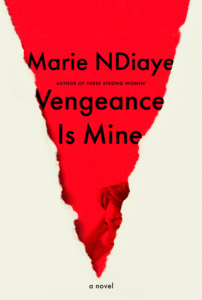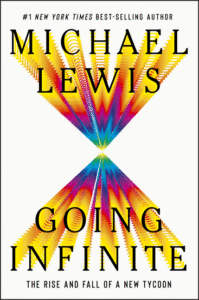
Our quintet of quality reviews this week includes Fatima Bhutto on Adania Shibli’s Minor Detail, Julian Lucas on Teju Cole’s Tremor, Hermione Hoby on Marie NDiaye’s Vengeance is Mine, David Roth on Michael Lewis’ Going Infinite, and Kristen Roupenian on Elizabeth Hand’s A Haunting on the Hill.
“The two halves of Palestinian author Adania Shibli’s slim, searing novel are bound by both minor and major details: a brutal gang rape and murder, the punishing heat, the eerie presence of a dog in distress and two nameless characters. The first is a fastidious, quietly malevolent Israeli platoon commander who organises the gang rape and murder of a young Bedouin. The second is a woman in Ramallah who stumbles upon the story in a newspaper decades later and becomes haunted by one minor detail—the fact that the girl’s assault happened 25 years to the day before she was born … The Negev gang rape at the heart of Minor Detail is a true story, carried out by Israeli soldiers in 1949. Another minor detail: according to declassified documents, the real-life commander answered his superior’s question on whether the girl was eventually returned to her village by reporting that his soldiers killed her because ‘it was a shame to waste the petrol.’ The atmosphere is one of unbearable tension, measured by the increasing anxiety of the dog who stands as helpless sentry over the girl. He howls and cries, pants and trembles, barking endlessly. Shibli’s writing is calm and tightly controlled, lyrical in its descriptions of cruelty and uncertainty. The terror Shibli evokes intensifies slowly, smoldering, until it is shining off the page … The second section of the novel follows a Palestinian woman as she hunts down information about the crime decades later. What ought to be an ordinary search—visiting two museum archives—becomes a logistical nightmare for someone living under occupation … All novels are political and Minor Detail, like the best of them, transcends the author’s own identity and geography. Shibli’s writing is subtle and sharply observed. The settlers and soldiers she describes in the second half of the novel are rendered with no malice or artifice; she writes of an elderly settler’s veined hands with tenderness, and as an author is never judgmental or didactic. The book is, at varying points, terrifying and satirical; at every turn, dangerously and devastatingly good.”
–Fatima Bhutto on Adania Shibli’s Minor Detail (The Guardian)
“His great theme is the limits of vision, and the way that these limits, when imaginatively confronted, can serve as the basis for a kind of second sight … An elegant and unsettling prose still-life, which reflects on art’s relationship to theft and violence, to privacy and togetherness, and to the way we mark time … If Open City was a bellwether of the last decade’s autofictional turn, Tremor occasionally sounds like a defense of the now-beleaguered genre … At least half of the novel, which hews rather closely to its protagonist’s consciousness, consists of ideas about how to live, listen, think, and see well … It’s tempting to characterize the novel as what the critic Becca Rothfeld calls ‘sanctimony literature,’ a mode of fiction designed to showcase the author’s ethical awareness. But there’s more going on than virtue signalling. Tunde’s worries over various moral problems—art restitution, the portrayal of the dead, artificial intelligence—converge on a dilemma that bedevils both him and his creator: Is there a way to represent the world and not ‘cannibalize the lives of others’? … A work of autofiction with the ambition of a systems novel, aspiring to illustrate the world’s interconnectedness without recourse to the fictional conventions of plot and psychological portraiture. Instead, it moves like an essay, interweaving slices of life with musings on Malian guitar virtuosos, astronomical phenomena, films by Ingmar Bergman and Abbas Kiarostami. Cole’s mind is so agile that it’s easy to follow him anywhere … There is a method to the meandering. Cole uses the resonance between fragments to imply a dimly apprehended totality, like a seismologist integrating measurements from different sites to map an earthquake … Fiction takes the transparency of other minds so much for granted that it can obscure the rarity of true communion—which doesn’t always require explanation, or even the exchange of words. Tremor, with its vision of separateness and synchronicity, is obliquely about the pandemic, much in the way that Open City revolved around 9/11.”
–Julian Lucas on Teju Cole’s Tremor (The New Yorker)

“No one could legitimately call Marie NDiaye ‘overlooked’…Nonetheless, the magnificence of her writing, in all its shocks of perception, makes you feel that by rights her name should come with the same pantheonic glow that attends, say, Annie Ernaux or Elena Ferrante. What makes her a master? In part, it’s NDiaye’s deft interweaving of those narrative traits we associate with genre fiction, specifically crime thrillers—suspense, mystery, intrigue, a touch of the supernatural—with a high-modernist sensibility in thrall to the shifting, refractive nature of memory, unsettled selfhood, and intersubjectivity tout court. To attempt to summarize NDiaye’s approach—this blend of the heady high and supposed low—is to properly appreciate what an unruly mix it is, one that surely risks chaos, or, worse, pretension. What a feat, then, that the author invariably marshals these strains into lucid sophistication, not least in her newest book, the superbly controlled Vengeance Is Mine … The plot is accelerated by these enigmas, while the prose fruitfully resists this velocity, submerging you into time-stretched and sensation-heightened dimensions. A friend once played me a Justin Bieber song that had been slowed down by 800 percent. ‘U Smile,’ a trite little burst of sugary pop, was now transfigured into thirty-five minutes of shimmering, transcendent washes of sound that felt like an appropriate score for the cosmos. It remains one of the most beautiful things I’ve ever heard. NDiaye does something like this with words. No life, no matter how modest or compromised or confused, is banal; through her telling and her talents, stray, lone consciousnesses are magnified to the epic.”
–Hermione Hoby on Marie NDiaye’s Vengeance is Mine (4Columns)

“Between Going Infinite and Walter Isaacson’s enormous biography of the increasingly daffy and grim Elon Musk, it has been a rough time for the Heroes of Capitalism genre. The future prospects for that type of book are certainly still bright; Americans aren’t going to stop revering rich people just because they are ‘awful’ or ‘boring’ any time soon. But the ways in which Going Infinite falls short suggests a problem that goes beyond a national shortage of sufficiently compelling or just acceptably non-sociopathic rich guys. The fact that Isaacson’s ‘The Genius Biographies’ series has declined from Leonardo Da Vinci to Steve Jobs to Elon Musk suggests not only that the heroes are getting less heroic, but that these books’ usual signifier of genius—vast wealth—has completely decoupled from any personal merit … Much of the satisfaction of these stories comes from how deftly Lewis explains those bigger issues and the artful, affectionate way that he colors in those characters. Lewis protagonists are not always admirable, and their motivations are not necessarily pure, but because they are correct and bold and often outside of an Establishment that is more smug or more self-interested or just slower than them, they tend to make for effective heroes. Going Infinite fails to deliver on either half of that formula. It’s not clear in the book, as it has never really been clear anywhere else, what social or economic problem is being addressed by cryptocurrency. This is doubly true of the ad hoc lawlessness of FTX … while he seldom fails to note the abstruse grandiosity that allows generalities about benefiting humanity to justify various smaller-scale inhumanities in the moment, Lewis does not doubt that Bankman-Fried wants to make many billions of dollars so that he can then give it away, at some point TBD, for some socially useful end, as effective altruism prescribes. The comedy is in the contrast—the reminder that all these strange, selfish, toweringly disagreeable people doing these socially useless things in a liminally legal space are actually doing them all to save humanity … Bankman-Fried is a weird guy and does plenty of weird things, but he is also never quite as brilliant as this story or the usual Lewis template would require. He’s absolutely high-handed and cold and difficult to be around in the ways that geniuses are, but any sense of his genius seems to have been reverse-engineered from how unstintingly, exhaustingly reckless and unpleasant and uncaring he is. As with Musk, the fact that Bankman-Fried was a billionaire when Lewis started reporting the book seems to not just color but retroactively justify what a turd he otherwise is; why else would this distinguished author be writing a book about him?”
–David Roth on Michael Lewis’ Going Infinite: The Rise and Fall of a New Tycoon (New York Magazine)
“…a ghost story conjured by representatives of a deceased author’s estate. It all sounds a little uncanny. Isn’t that the case, though, whenever we try to resurrect dead writers? In the past decade, a resurgence of acclaim has fully established Shirley Jackson as the queen of dark literary fiction, and there is no surer sign of an author’s success than the arrival of a new generation of writers eager to channel her spirit, rereading and reimagining her work. So much for the death of the author … These days, the more sophisticated literary estates may be less likely to hire ghostwriters to imitate a deceased writer’s work; instead, they authorize established writers to continue the work (and share cover credit) under their own names. The premise of a seamless transition, in which the original author slips off into the afterlife unnoticed, has been replaced by a Frankenstein-like chimera of the living and the dead…Such collaborations tend to be respectful, reasonably successful, and positively reviewed, but there often is, nonetheless, something unnervingly lifeless about them. Like all the undead, the books’ resurrected protagonists are free to perform only a few limited actions, shadowy repetitions of actions they took in life—solving mysteries, spying on behalf of England, channelling the One Power. It’s hard to read them without imagining those unseen authorities peering over the writer’s shoulder and wondering about the limits of their good will … the creation of official sequels and spinoffs is inevitably haunted by questions of agency, power, and control. To join Elizabeth Hand on her journey to Hill House is to be reminded of the slippery dominance of genius, the way it both establishes and breaks its own rules, tempting then trapping those who dare to follow them. Faithfully adhering to the rules doesn’t guarantee success, yet breaking them will inevitably invite accusations of failure and betrayal. Each reader who arrives at A Haunting on the Hill hoping to return to the original Hill House will feel disappointed in her own way, although the shape of her disappointment will speak more to the nature of her loyalty to Jackson than to the qualities of the new book. Perhaps unsurprisingly, A Haunting on the Hill is least successful when Hand directly imitates Jackson, most successful when she draws on her own talents—and becomes truly fascinating when Hand lets those anxious whispers about authority and influence take over the tale.”
–Kristen Roupenian on Elizabeth Hand’s A Haunting on the Hill (The New Yorker)

